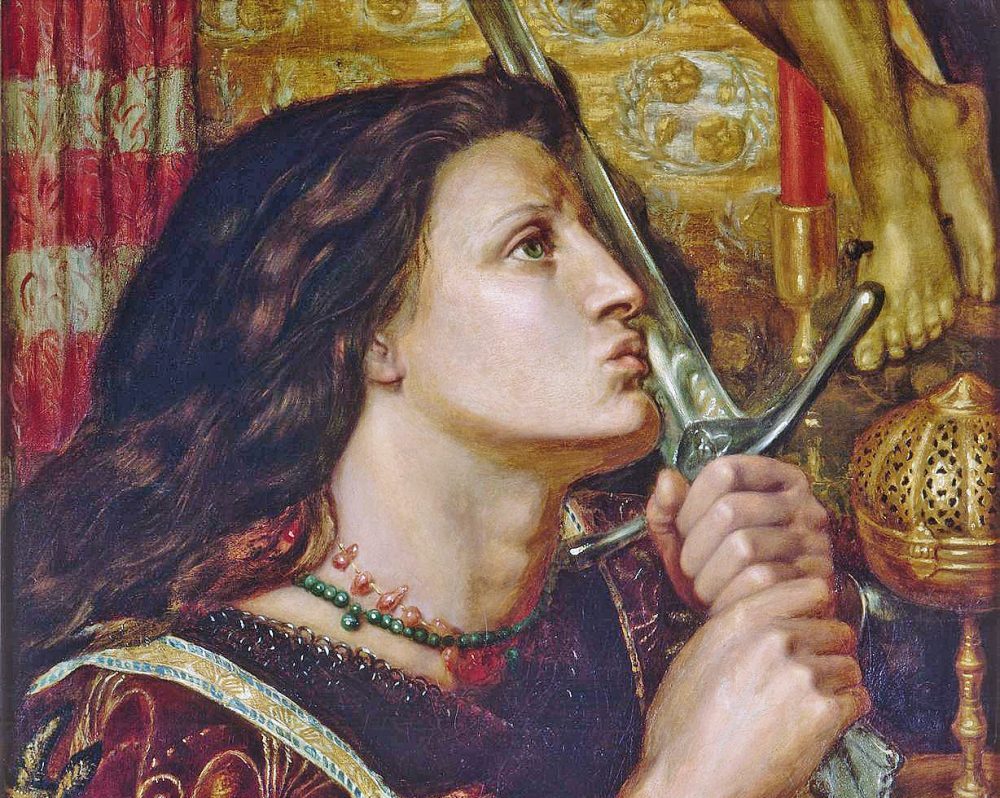By Vir Christi
St Joan of Arc
Virgin & Martyr
Born January 6, 1412
Died May 30, 1431
Feast Day: May 30
France in Peril
Imagine, if you will, that the United States has gone to war with Canada over a border dispute that the two countries have had for centuries, and then imagine that the war has raged for more than eight decades. Picture the Americans starting out with great promise, and then being on the losing end of a number of battles and campaigns, so much so that the idea of an American army beating a Canadian army on the battlefield is not only a stretch but laughable. Visualize that the war has been so brutal in terms of the loss of manpower and the destruction of property that the central government in the United States has vanished. While the president and Congress still exist, their power is nominal and they have been driven out of Washington to a remote location in the American Southwest.
If that image causes discomfort, then you have grasped the state of affairs that existed in France at the time of Saint Joan of Arc. France was embroiled in the Hundred Years’ War with England. By the time Joan was born in 1412, the war had been going on for seventy-five years. The English had won a seemingly endless string of victories, absorbed a considerable share of modern-day France, and driven the French out of all of their major strongholds. The part of France not occupied by the English was a de facto vassal state to the English king. The people of France had no remaining hope of victory, with their lives dark and uncertain because of the conditions that the war had brought about. No competent military or political leader had risen up to rally the French in driving out the English, and it seemed like one would never come.
God’s Humble Maid
Joan was born into the obscure village of Domremy, France, and by the account of one of her closest childhood companions—Jean Massieu—she was one of the most pious people in her village. She was deep in prayer one day when she had a vision from Saint Michael the Archangel and other saints. They instructed her to go to the Dauphin (the future King Charles VII) and tell him that God was sending Joan to begin the expulsion of the English from France. Joan was stunned by the command, but being God’s ever-dutiful servant, she obeyed and went to seek an audience with the Dauphin. Charles and his advisors scoffed at first at the idea that sixteen-year-old Joan was who she claimed to be, and debated among themselves whether or not to entrust her with the command.
France’s Stirring Hope…and the King’s Betrayal
After a rigorous, lengthy examination of her character, Joan was given a military command. She was sent to lift the siege of Orleans, which was the first part of the mandate given to her by God. To the astonishment of English and French alike, Joan’s army smashed the besieging English forces and drove them from Orleans. This was the first of a series of impressive victories that Joan won. This young maiden of such humble origins was leading the armies of France to victories they had never dreamed possible. Most astounding of all was the fact that she asked for very little in return for those victories. Charles offered her any reward she desired in exchange for the service that she had done for France. Joan requested that her little village of Domremy be exempt from taxation into perpetuity: a request that was honored by the French government until sometime in the twentieth century.
From the time her service began, Joan knew she would only have a limited period to win her victories; according to the account given by Massieu in Mark Twain’s Joan of Arc, she foretold that she would only have a year to do the work that God had assigned her. That prediction came true when, during military action around Compiegne, she was captured by the Burgundians (forces in league with the English). The English had branded her the “Witch of Orleans” by that point, and greatly desired her death. The Burgundians held her for ransom, but staggeringly Charles never offered a ransom for her. The English ultimately paid her ransom, and then put her through a staged theatrical trial by English clerics in the hopes of getting her condemned to death. They were unable to convict her on her testimony. Their only relief came when Joan, in defiance of an order she had been given by the court, changed out of the dress she had been wearing back into military clothes as a guard against being raped. The English used that to condemn Joan to death, and burned her at the stake.
Joan’s Legacy and the Future of France
After Joan’s execution, she became a symbol for French patriots everywhere as someone willing to die for the cause. Charles realized the mistake he had made in allowing his greatest soldier to be captured and executed. His behavior following Joan’s death showed where once he had been an indifferent (and somewhat incapable) monarch, he was now a decisive king fully in command of his government and his armies. Joan had breathed a fighting spirit back into France. Twenty years after her death, the English would conclude a peace agreement and consent to abandon all of their French territorial claims for good.
So what does this mean for us? How can we live up to the spirit of Saint Joan of Arc? She bravely resisted abandoning the mission she had been given by God, despite knowing that martyrdom awaited her at the end of it, and trusted that the Holy Spirit would guide her both on the battlefield and in the courtroom. She persevered despite being abandoned by her king, and died without any of her friends surrounding her. All this while just a teenager! Joan knew the cost and faced the fire (literally as well as figuratively), arising from humble origins to lead her people to better days. What “yes” is God inviting you to give in your life today, despite how huge and scary the challenge it entails may be, for you to lead the others around you?
Let Joan’s last words be an encouragement to you, and a reminder that God does not abandon us in our darkest times: “Hold the cross high so I may see it above the flames.”
Saint Joan of Arc, ora pro nobis!

Vir Christi
Vir’s heart has been on fire for the Church from day one, and he dreams of the day when Constantinople will be a city again. He has a competitive drive satiated by sports and board games, but is also just as happy to sit down and read a good book for hours on end.






0 Comments